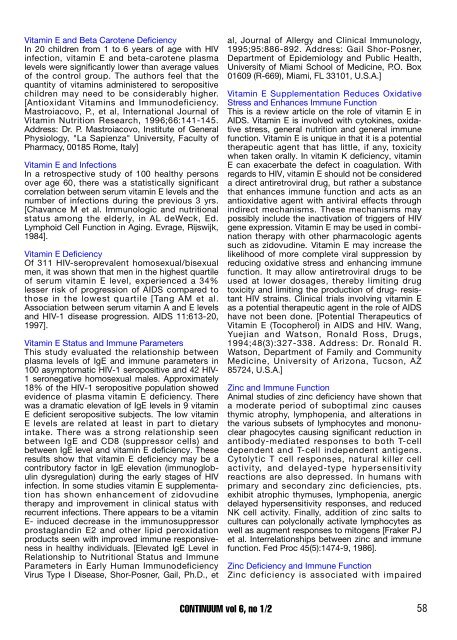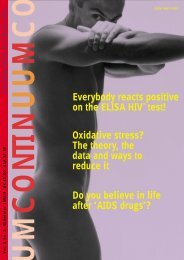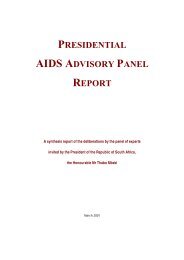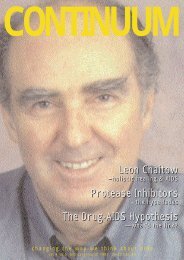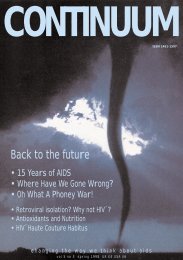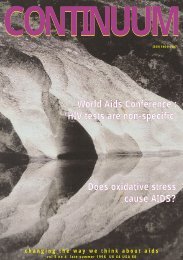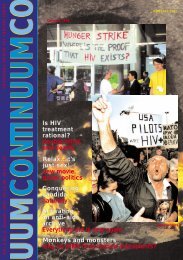AIDS post-HIV : beat of a different drummer - AltHeal
AIDS post-HIV : beat of a different drummer - AltHeal
AIDS post-HIV : beat of a different drummer - AltHeal
You also want an ePaper? Increase the reach of your titles
YUMPU automatically turns print PDFs into web optimized ePapers that Google loves.
Vitamin E and Beta Carotene Deficiency<br />
In 20 children from 1 to 6 years <strong>of</strong> age with <strong>HIV</strong><br />
infection, vitamin E and beta-carotene plasma<br />
levels were significantly lower than average values<br />
<strong>of</strong> the control group. The authors feel that the<br />
quantity <strong>of</strong> vitamins administered to sero p o s i t i v e<br />
c h i l d ren may need to be considerably higher.<br />
[Antioxidant Vitamins and Immunodeficiency.<br />
M a s t roiacovo, P., et al, International Journal <strong>of</strong><br />
Vitamin Nutrition Research, 1996;66:141-145.<br />
A d d ress: Dr. P. Mastroiacovo, Institute <strong>of</strong> General<br />
P h y s i o l o g y, "La Sapienza" University, Faculty <strong>of</strong><br />
Pharmacy, 00185 Rome, Italy]<br />
Vitamin E and Infections<br />
In a re t rospective study <strong>of</strong> 100 healthy persons<br />
over age 60, there was a statistically significant<br />
correlation between serum vitamin E levels and the<br />
number <strong>of</strong> infections during the previous 3 yrs.<br />
[Chavance M et al. Immunologic and nutritional<br />
status among the elderly, in AL deWeck, Ed.<br />
Lymphoid Cell Function in Aging. Evrage, Rijswijk,<br />
1984].<br />
Vitamin E Deficiency<br />
Of 311 <strong>HIV</strong>- s e ro p revalent homosexual/bisexual<br />
men, it was shown that men in the highest quartile<br />
<strong>of</strong> serum vitamin E level, experienced a 34%<br />
lesser risk <strong>of</strong> pro g ression <strong>of</strong> <strong>AIDS</strong> compared to<br />
those in the lowest quartile [Tang AM et al.<br />
Association between serum vitamin A and E levels<br />
and <strong>HIV</strong>-1 disease pro g ression. <strong>AIDS</strong> 11:613-20,<br />
1997].<br />
Vitamin E Status and Immune Parameters<br />
This study evaluated the relationship between<br />
plasma levels <strong>of</strong> IgE and immune parameters in<br />
100 asymptomatic <strong>HIV</strong>-1 seropositive and 42 <strong>HIV</strong>-<br />
1 seronegative homosexual males. Appro x i m a t e l y<br />
18% <strong>of</strong> the <strong>HIV</strong>-1 seropositive population showed<br />
evidence <strong>of</strong> plasma vitamin E deficiency. There<br />
was a dramatic elevation <strong>of</strong> IgE levels in 9 vitamin<br />
E deficient seropositive subjects. The low vitamin<br />
E levels are related at least in part to dietary<br />
intake. There was a strong relationship seen<br />
between IgE and CD8 (suppressor cells) and<br />
between IgE level and vitamin E deficiency. These<br />
results show that vitamin E deficiency may be a<br />
contributory factor in IgE elevation (immunoglobulin<br />
dysregulation) during the early stages <strong>of</strong> <strong>HIV</strong><br />
infection. In some studies vitamin E supplementation<br />
has shown enhancement <strong>of</strong> zidovudine<br />
therapy and improvement in clinical status with<br />
recurrent infections. There appears to be a vitamin<br />
E- induced decrease in the immunosuppre s s o r<br />
p rostaglandin E2 and other lipid pero x i d a t i o n<br />
products seen with improved immune responsiveness<br />
in healthy individuals. [Elevated IgE Level in<br />
Relationship to Nutritional Status and Immune<br />
Parameters in Early Human Immunodeficiency<br />
Virus Type I Disease, Shor- P o s n e r, Gail, Ph.D., et<br />
al, Journal <strong>of</strong> Allergy and Clinical Immunology,<br />
1995;95:886-892. Address: Gail Shor- P o s n e r,<br />
Department <strong>of</strong> Epidemiology and Public Health,<br />
University <strong>of</strong> Miami School <strong>of</strong> Medicine, P.O. Box<br />
01609 (R-669), Miami, FL 33101, U.S.A.]<br />
Vitamin E Supplementation Reduces Oxidative<br />
Stress and Enhances Immune Function<br />
This is a review article on the role <strong>of</strong> vitamin E in<br />
<strong>AIDS</strong>. Vitamin E is involved with cytokines, oxidative<br />
stress, general nutrition and general immune<br />
function. Vitamin E is unique in that it is a potential<br />
therapeutic agent that has little, if any, toxicity<br />
when taken orally. In vitamin K deficiency, vitamin<br />
E can exacerbate the defect in coagulation. With<br />
regards to <strong>HIV</strong>, vitamin E should not be considered<br />
a direct antiretroviral drug, but rather a substance<br />
that enhances immune function and acts as an<br />
antioxidative agent with antiviral effects thro u g h<br />
i n d i rect mechanisms. These mechanisms may<br />
possibly include the inactivation <strong>of</strong> triggers <strong>of</strong> <strong>HIV</strong><br />
gene expression. Vitamin E may be used in combination<br />
therapy with other pharmacologic agents<br />
such as zidovudine. Vitamin E may increase the<br />
likelihood <strong>of</strong> more complete viral suppression by<br />
reducing oxidative stress and enhancing immune<br />
function. It may allow antire t roviral drugs to be<br />
used at lower dosages, thereby limiting drug<br />
toxicity and limiting the production <strong>of</strong> drug- resistant<br />
<strong>HIV</strong> strains. Clinical trials involving vitamin E<br />
as a potential therapeutic agent in the role <strong>of</strong> <strong>AIDS</strong><br />
have not been done. [Potential Therapeutics <strong>of</strong><br />
Vitamin E (To c o p h e rol) in <strong>AIDS</strong> and <strong>HIV</strong>. Wa n g ,<br />
Yuejian and Watson, Ronald Ross, Drugs,<br />
1994;48(3):327-338. Address: Dr. Ronald R.<br />
Watson, Department <strong>of</strong> Family and Community<br />
Medicine, University <strong>of</strong> Arizona, Tucson, AZ<br />
85724, U.S.A.]<br />
Zinc and Immune Function<br />
Animal studies <strong>of</strong> zinc deficiency have shown that<br />
a moderate period <strong>of</strong> suboptimal zinc causes<br />
thymic atro p h y, lymphopenia, and alterations in<br />
the various subsets <strong>of</strong> lymphocytes and mononuclear<br />
phagocytes causing significant reduction in<br />
antibody-mediated responses to both T- c e l l<br />
dependent and T-cell independent antigens.<br />
Cytolytic T cell responses, natural killer cell<br />
a c t i v i t y, and delayed-type hypersensitivity<br />
reactions are also depressed. In humans with<br />
primary and secondary zinc deficiencies, pts.<br />
exhibit atrophic thymuses, lymphopenia, anerg i c<br />
delayed hypersensitivity responses, and re d u c e d<br />
NK cell activity. Finally, addition <strong>of</strong> zinc salts to<br />
cultures can polyclonally activate lymphocytes as<br />
well as augment responses to mitogens [Fraker PJ<br />
et al. Interrelationships between zinc and immune<br />
function. Fed Proc 45(5):1474-9, 1986].<br />
Zinc Deficiency and Immune Function<br />
Zinc deficiency is associated with impaire d<br />
CONTINUUM vol 6, no 1/2 58


